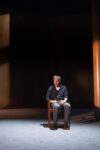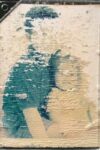As a member of the National Theater of Romania, I have been watching our culture struggle to come to terms with who we are in a modern world. And, though I spend more of my time acting in films now, I still yearn for the theater to be of consequence to Central Europe where we have a remarkable legacy. This is why it has been lovely to explore a transcontinental friendship with Sarah Kornfeld, a writer who grew up in the theater (her father was the managing director for The Living Theatre, and was the artistic director for Judson Poets Theater in New York City). I asked to interview Sarah to explore her new book, The True.
The True is about Sarah’s search for the cause of death for the Romanian director, Alexandru Darie, who was the head of the Bulandra Theater and died tragically (and had been in a long relationship with Sarah). The book explores how she fell into a con when a young woman convinced her that she was Darie’s girlfriend and that there had been foul play. The book is a searing look at Romanian culture, but also about the entire world that seems caught up in social media and a “drama” of lies and corruption. I wanted to explore the role of the theater in her book, and the characters we play in the world. We emailed back and forth for this interview.

Istvan Teglas: Sarah, you grew up in the theater. What insights did the theater give you about the “real world”?
Sarah Kornfeld: Well, for certain, it allowed me to see the “character” in every person, and how similar theater patterns are reflected in real life. People, humans in the world, parallel the amazing plays throughout history. There really are heroes and villains, lovers and fools. Yet, in the “real world” people tend to play all the roles at one point or another, and so it is helpful to have plays to look back upon to predict the outcomes. Shakespeare tends to nail our choices and how we choose incoherently. Where modern playwrights tend to explore how people respond to the structures of the world, and how much energy it takes to rebel against the status quo. Theater is a fabulous place to explore what futurists call predictive modeling, every scenario has been worked through in world theater.
Did you make a conscious decision to leave the theater? If so, what was it?
I thought I would stay in the theater forever. I was on stage by the time I was six, and had performed with the Bread and Puppet Theater, The Ridiculous Theatrical Company, at Judson and others. Yet, in 1981 we started to lose friends to AIDS, and finally, by the time I was in my twenties in the early 90s I was doing my first production on my own and when I stood on the stage the closing night all I could see were the empty seats where our friends should have been sitting. This was particularly freaky because it was a full house. But, I only saw where Charles Ludlam should be sitting, or my friend Michael, or Chris, but they were all gone. I simply felt that their loss was too deep a loss for me, and for the theater, and I moved away to start a different life. This led me to writing.
How did growing up in the theater inform how you understand world events? I mean, did all that Shakespeare influence how you see power?
Oh, for sure! What’s really crucial in theater is “subtext” those unspoken agendas or actions of characters. World events are driven by people who want power, who want to influence, and who have a combination of good and bad “subtext”. Shakespeare influenced me, but so did Brecht, and for that matter so did Moliere who made fun of those in power. Writers like Maria Irene Fornes and Suzan Lori Parks take on the conflict within characters as they explore the reality of corruption within culture. The current “power plays” we see in global leadership appear to me to be a tragedy because they don’t know how to lead people towards a better world, instead their “action” is driven largely by fear and greed, and we can find that scenario in everything from the Greeks to African writers, European farce to American modernists. Power that is (at its heart) broken is a main driver in drama.
In your book The True you write about how much you love Romanian theater artists. What is it about us that is so compelling?
Istvan, you have to believe me! I think the acting that I have seen in Romania, and the scope of the epic theater there is some of the best theater I have ever seen. What you all have (and particularly you) is an ability to blend the body with words. Romanian actors seem to be equally well trained as movers (or modern dancers) as they are with language. Perhaps this will not be the case moving forward in this TV centric era, but from what I have seen I have been moved and impressed. I also love how your culture has an almost obsessive need to capture the truth of each moment. I don’t know if that is because you are reflecting on the impact of Communism and totalitarianism on your culture, but it’s edgy and exciting to me.
You were in a relationship with Darie, why do you think you believed in the con artist who said she was his girlfriend? Was she such a good actress?
She was a good actress, but I was mainly a character lost in my own life. When you get caught in a con it is generally a reflection of how you are disconnected from the truth of your own voice, narrative, and life. I was so lost in grief that I could not see clearly, and I ignored the overly dramatic plot that was laid out before me. Hey, just because I grew up around plays does not mean I can’t be immune to a clever character. In the end, she did not want money from me, she wanted to be seen, and this also makes me love her, feel for her, although she has disappeared completely from my life.
Do you think that The True is a modern myth? It seems to explore many different genres, and also to use the dramatic structure as though it were a play. Are you suggesting that “all the world’s a stage”?
When I realized I had lived two years in a lie I saw how I had been in a play within a play, and so I went about trying to write that in a narrative form. So, the language is like what one might find in a play, then it jumps to journalism, then it jumps to true crime and finally the book ends in a dream. This was the only way I could think to bring the reader into the feeling of being in a con, to make it as murky a rollercoaster ride as possible. So, yes, all the world’s a stage and in this book I wanted all the players in it to take the reader on a wild ride, with the final reflection being how we actually long for forgiveness, to be characters who are seen by those we love.
I’m making more movies these days and find that they reflect the world in a deep way. Are you afraid the theater is out of touch with the world?
This is complicated because we are living in an explosion of film and television. There is so much exciting storytelling in film these days exploring narratives and ideas that are non-linear. Films have plots and characters that go everywhere from Doctor Strange moving through the metaverse, to characters living below the surface of a house in Parasite. And, perhaps because of this explosion of images and choices audiences want something different from the performing arts — perhaps more immediacy and also a wild ride. In 2001 I started to work as a producer and collaborator in the art and technology space, and we were hoping that artists could use technology to explore stories in a new, deep way using tech as a “paintbrush.” Now, many theaters have adopted video, multimedia and film into their work, though it is still up to theater artists to find the humanity in their work to really engage the hearts of the audience. If that humanity is not found then the theater could end up being like a movie itself, or a late show in Las Vegas, all “product” and little love. I think we are waiting for our modern Charlie Chaplin who will integrate heart and technology for theater — I am sure she will show up!
At the end of The True we find ourselves with you in a dream. It’s in the Bulandra Theater filled with ghosts like Moliere, Ciulei, Darie, Bulgakov, Sarah Bernhardt, Sam Shepard, and more. Why does it end with ghosts, and what are you trying to say about life?
Well, ghosts are everywhere, especially in theaters. My ghosts followed me into this book and I let them have the final say. In fact, in the section at the end of the book it is the ghosts that finally tell the truth about my search, about the state of art and politics. And, this seems right to me, that they should have the wisdom we don’t have. Our ghosts are really ourselves, just like we are all the characters in our dreams — when we know this we can accept that we are learning from ourselves, and that ghosts have a lot to tell us, and I think it’s probably words of caution: stay awake, trust yourself, be brave.
Thank you, Sarah. I wish we were closer so we could have a coffee.
Me too, I miss you. Let’s hope Covid ends and we can sit together again.
*****
Istvan Teglas is a Hungarian actor based in Bucharest, Romanian. He is a senior member of The National Theater of Romania, as well as a modern dancer known for his work with choreographer Andreea Novac. He is an award winning film actor (in 2020 he was awarded the Gopo Award, the equivalent to an Oscar in Eastern Europe) who has worked with the film directors Cristi Puiu, Horatiu Malaele and Corneliu Porumboiu. He is an outspoken anti-corruption and human rights activist.
Sarah Kornfeld is an American author, playwright, and producer. Her play, THE LOVEDEATH OF CLOWNS was produced at the Theater For The New City in New York. Her debut novel, WHAT STELLA SEES was published in 2018. Her writing has been featured in independent literary journals including Vol.1 Brooklyn, Largehearted Boy, and Heavy Feather Review. Her recent narrative non-fiction book is THE TRUE published in English, French and Romanian. Kornfeld received her BA from Sarah Lawrenece College and received professional training at the Royal Court Theater in London.
This post may contain affiliate links.







